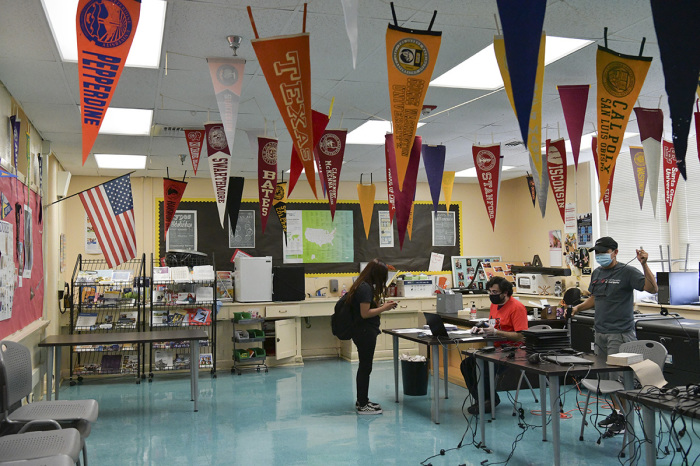'A national concern': Alarming drop in students' US history and civics scores, report shows

Test scores in U.S. history and civics declined for eighth-grade students across the country, according to a new report released amid growing concerns about public education, as other data show that reading and math scores are also at record lows.
The National Assessment for Education Progress, also known as the Nation’s Report Card, released the scores Wednesday, documenting U.S. history and civics scores in separate reports. The scores used in the evaluation ranged from zero to 500.
NAEP, a congressionally mandated program overseen by the U.S. Department of Education, reported that eighth-grade scores for U.S. History went from 263 in 2018 to 258 in 2022, declining by five points. In civics, the students had an average civics score of 150 out of 300 for 2022, a decrease of three points since 2018.
Only 13% of eighth-grade students were rated as proficient in U.S. history, and only 1% of eighth-grade students were rated as advanced. For civics, 20% of students were considered proficient, and only 2% were rated as advanced.
"A well-rounded education includes a thorough grounding in democratic principles, and these assessments challenge students to show their knowledge and skills as they prepare to become full participants in American democracy," National Center for Education Statistics Commissioner Peggy G. Carr said in a Wednesday statement.
"Self-government depends on each generation of students leaving school with a complete understanding of the responsibilities and privileges of citizenship,” she continued. “But far too many of our students are struggling to understand and explain the importance of civic participation, how American government functions, and the historical significance of events. These results are a national concern."
The latest NAEP assessment comes on the heels of a separate report from the same organization purporting that reading and math scores for 9-year-old students saw historic declines during the COVID-19 pandemic.
As The Christian Post previously reported, NAEP released a report last September based on its assessment of 7,400 9-year-old students from 410 schools in 2022. NAEP conducted the assessment from January to March 2020 and 2022. Ninety-two percent of the schools assessed in 2022 NAEP had previously examined in 2020.
“Average scores for age 9 students in 2022 declined 5 points in reading and 7 points in mathematics compared to 2020,” the September report stated. “This is the largest average score decline in reading since 1990, and the first-ever score decline in mathematics.”
The assessment found differences in scores between students attending suburban schools versus students attending city schools. City students scored 213 on average in reading and a score of 236 in math in 2020, which declined by seven points in 2022.
For students attending suburban schools, their reading score of 225 in 2020 decreased by 8 points in 2022. Suburban school students’ math scores also went from 245 in 2020 to 236 in 2022.
In a statement at the time, Carr contended that the data revealed the pandemic’s toll on education, arguing that COVID-19 likely “exacerbated” pre-existing learning challenges, particularly for students that were already underperforming.
“There’s been much speculation about how shuttered schools and interrupted learning may have affected students’ opportunities to learn,” she stated.
The NCES commissioner highlighted how 9-year-old students in the 10th learning percentile saw a 6-point decrease, and students in the 25th learning percentile experienced a 4-point score decrease in 2020. Students in the 10th percentile for reading also experienced a 7-point decrease in 2020.
Regarding the impact of remote learning conditions on student behavior, another NCES study from last July found that 87% of public schools reported the pandemic negatively impacted students’ socio-emotional development for the 2021-2022 school year.
NCES collected data from 846 participating schools between May 10-24, 2022, and found that 83% of the public schools assessed in the study agreed that students’ behavioral development was negatively affected by the pandemic, with over half of them reporting increases in student misconduct in the classroom.
Samantha Kamman is a reporter for The Christian Post. She can be reached at: samantha.kamman@christianpost.com. Follow her on Twitter: @Samantha_Kamman




























